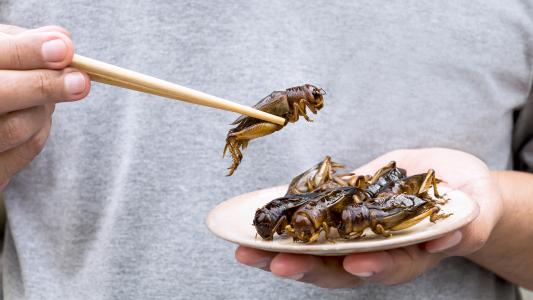To combat malnutrition in children, researchers developed a food supplement that doesn’t just deliver calories, but also helps promote the development of healthy gut bacteria — and it showed remarkable success in a recent clinical trial.
“A small amount of this food supplement can actually cure malnutrition in children,” researcher Tahmeed Ahmed of the International Centre for Diarrhoeal Disease Research, Bangladesh (ICDDRB), told Science Magazine.
Why it matters: More than 150 million children under the age of five are malnourished, meaning they aren’t getting the right amount of calories or nutrients needed to support healthy growth. About 45% of all deaths in that age group are due to the child not getting adequate nutrition.
The challenge: To address malnutrition in children, aid workers often distribute prepackaged, ready-to-use supplementary food (RUSF) — but food alone isn’t enough to turn a malnourished child into a healthy one.
“Malnutrition has proven (extraordinarily) difficult to treat,” researcher Jeffrey I. Gordon, a microbiologist at Washington University School of Medicine in St. Louis (WUSTL), said in a press release.
“Standard calorie-dense therapeutic foods have been shown to prevent the deaths of malnourished children,” he continued, “but have been ineffective in overcoming growth stunting and other damaging effects of malnutrition, including impaired brain development, bone growth, and immune function.”
The gut: The human gut contains trillions of microbes, known collectively as the “gut microbiome,” that help us digest food and produce vitamins. A healthy microbiome has also been linked to better brain development, immune function, and more.
When researchers at WUSTL and ICDDRB compared the gut microbiomes of malnourished and healthy children, they found the microbiomes of the latter were more developed — so they designed a supplement to close the gap.
How it works: After identifying gut bacteria correlated with growth in animals and humans, the researchers tested out combinations of foods available in Bangladesh to see which best promoted the growth of those bacteria.
They landed on a combination containing chickpeas, soy, bananas, and peanuts, which they call “MDCF-2.”
Repair of the gut microbiome appears to be key to healthy growth in these children.
Jeffrey I. Gordon
In a clinical trial, about 120 malnourished children between the ages of 12 months and 18 months received either the special supplement or the same amount of the standard RUSF twice daily for three months.
Based on regular weight, length, and arm circumference measurements, as well as blood and feces samples, the supplement did a better job of addressing malnutrition in children — even though it contained 20% fewer calories.
“This suggests that the repair of the gut microbiome, and not just additional calories, is key to healthy growth in these children,” Gordon said.
The cold water: Despite the claim of a unique “cure” for malnutrition, we don’t know what long-term benefit (if any) the supplement might have over a simply more reliable food supply.
The study stopped checking in on the children after four months. The supplement also must be made fresh, limiting storage and distribution options for addressing malnutrition in children globally.
The next steps: The researchers plan to conduct additional trials in other parts of the world, using a supplement made from locally available, culturally acceptable ingredients. They aim to follow up with the children in those trials for five years to see how long the benefits of the supplement might persist.
They also hope to develop versions of their gut-altering supplement that could be stored for months.
We’d love to hear from you! If you have a comment about this article or if you have a tip for a future Freethink story, please email us at [email protected].






